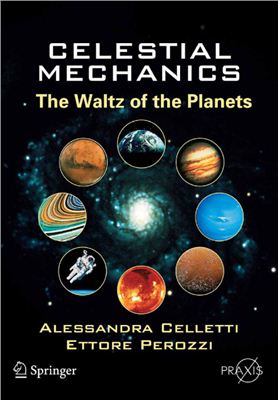Praxis Publishing, 2007, 245 pages
The common perception of Celestial Mechanics is that of a discipline which needs advanced mathematics and astronomy to be understood. Yet mode Celestial Mechanics has a rather different taste and a truly interdisciplinary nature. The number of celestial objects known to mankind has dramatically increased, the long-awaited presence of extrasolar planets has been eventually detected around other stars, spaceflight dynamics has brought new applications encompassing rocked dynamics, the place-in-orbit of artificial satellites and interplanetary mission design. Solar System exploration has grown as a long term strategy for the construction of a permanent base on the Moon and a manned mission to Mars.
The aim of the book is to show to the people at large, as well as to a more skilled audience, the many fascinating aspects of mode celestial mechanics. After giving to the reader the necessary technical tools needed for a basic understanding of the underlying physical phenomena (using only elementary mathematics), facts and figures are provided on historical events, mode discoveries and future applications. Contents are divided into major topics where the three "souls" of mode celestial mechanics (dynamical systems, Solar System & stellar systems, spaceflight dynamics) play a major role. As an example, spin-orbit resonances can be explained using fractional algebra and subsequently described in action as "cosmic spinning tops". Easily observable effects such as the existence of a "dark side of the Moon" (and of many other satellites) can be compared to the "complete synchronous rotation" achieved by a geostationary telecommunication satellite in order to be always in view of the receiving parabolas on the ground. On longer time scales, the consequences of spin-orbit interaction may dramatically change the evolution of a planet when chaos enters the scene and must be taken into account in searching habitable planets around other stars.
The common perception of Celestial Mechanics is that of a discipline which needs advanced mathematics and astronomy to be understood. Yet mode Celestial Mechanics has a rather different taste and a truly interdisciplinary nature. The number of celestial objects known to mankind has dramatically increased, the long-awaited presence of extrasolar planets has been eventually detected around other stars, spaceflight dynamics has brought new applications encompassing rocked dynamics, the place-in-orbit of artificial satellites and interplanetary mission design. Solar System exploration has grown as a long term strategy for the construction of a permanent base on the Moon and a manned mission to Mars.
The aim of the book is to show to the people at large, as well as to a more skilled audience, the many fascinating aspects of mode celestial mechanics. After giving to the reader the necessary technical tools needed for a basic understanding of the underlying physical phenomena (using only elementary mathematics), facts and figures are provided on historical events, mode discoveries and future applications. Contents are divided into major topics where the three "souls" of mode celestial mechanics (dynamical systems, Solar System & stellar systems, spaceflight dynamics) play a major role. As an example, spin-orbit resonances can be explained using fractional algebra and subsequently described in action as "cosmic spinning tops". Easily observable effects such as the existence of a "dark side of the Moon" (and of many other satellites) can be compared to the "complete synchronous rotation" achieved by a geostationary telecommunication satellite in order to be always in view of the receiving parabolas on the ground. On longer time scales, the consequences of spin-orbit interaction may dramatically change the evolution of a planet when chaos enters the scene and must be taken into account in searching habitable planets around other stars.

